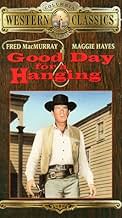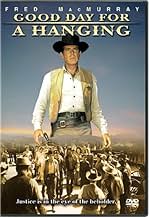अपनी भाषा में प्लॉट जोड़ेंAfter claiming his daughter's childhood-sweetheart killed the marshal, one man finds himself in conflict with his daughter, his fiancée and many of the townsfolk.After claiming his daughter's childhood-sweetheart killed the marshal, one man finds himself in conflict with his daughter, his fiancée and many of the townsfolk.After claiming his daughter's childhood-sweetheart killed the marshal, one man finds himself in conflict with his daughter, his fiancée and many of the townsfolk.
Margaret Hayes
- Ruth Granger
- (as Maggie Hayes)
Gregg Barton
- Frank
- (बिना क्रेडिट के)
John Barton
- Townsman
- (बिना क्रेडिट के)
कहानी
क्या आपको पता है
- ट्रिवियाAccording to Robert Vaughn in his memoirs, Fred MacMurray was the frugal type. He always brought his sandwich for lunch on the set and was also the stingy kind for many details.
- गूफ़When Ben is talking to Molly Cain on the widow's front porch, her mailbox can be seen on the fence in front of her house. The movie is set in 1870, but the postal service didn't start delivering to rural mailboxes until 1903, and that style of mailbox wasn't invented until 1915.
- भाव
Ruth Granger: Eddie is just a boy. Tom was killed by a hardened criminal.
Ben Cutler: Do you think this kid is any less hardened? Since when is a young rattlesnake any less poisonous than an old one?
- कनेक्शनReferenced in Fantastical Features - Nathan Juran at Columbia (2023)
फीचर्ड रिव्यू
Seeing this today -- an inexpensive 1958 undistinguished Western with talent in the declining years of their careers -- is a curious experience. The studios ground out hundreds of these in the 1940s and 1950s until inundated by the flood of TV westerns that were even cheaper. Towards the end of their life trajectory there was some attempt to distinguish them from TV fare by calling them "adult Westerns," meaning that the plot was more than twenty-one years old.
But it's instructive to watch something like this from a distance of almost half a century. A few points leap out at the viewer unbidden. One, for instance, is that this particular piece owes an awful lot to "High Noon," a highly successful inexpensively made Western with an aging star, released eight years earlier. The marshall begins his career with the support of the entire town, loses it, and winds up standing alone, even against the wishes of his family. The ticking off of Gary Cooper's sources of support -- relentlessly, inexorably, one by one -- in "High Noon" was sometimes a bit hard to swallow, but the arguments against supporting Marshall Kane (there's a "Marshall Kane" in this one too, the writers not having stretched too much) at least involved sometimes rather complex motives. They wanted Cooper out of town for various reasons, but all of them more or less plausible. Here, a couple of drinks from the defense counsel and all the aldermen and town councilmen ("the town's most respected citizens") are against hanging the kid. Nobody seems to think very hard. Oh -- and the defense counsel is a sight to behold, personally insulting MacMurray and having a fist fight with him, wearing a perpetual sneer, and using oily and insinuating locutions. (No penalties for overacting.)
The second things that leaps out at the viewer is the script. We've grown so accustomed to hearing period speech in recent Westerns that it comes as a shock to find not even a perfunctory nod to periodicity in this movie. Every character speaks as if it were 1958 instead of 1888. And as if they were all middle-class screenwriters living in Hollywood. The grammar is eighth-grade perfect and there is not a regionalism in sight. You get the impression that if someone had said anything like, "I don't know nuthin' about that -- I laid down the snaffles under the ramada by the remuda," everyone around him would be frozen into tonic immobility.
The acting is, for the most part, okay. MacMurray is a competent professional, Robert Vaughan does an excellent psychopath while breaking into tears during the trail in order to gain the jury's sympathy. Emil Meyers is always good, although his part here is too small. His widow is overplayed by the actress. And, as I say, the defense counsel belongs in a Cecil B. DeMille movie.
I'm glad I watched it. It's a genuine period piece. They no longer turn out Westerns like this. They turn out cheaply made slasher flicks in their stead. I think I prefer Westerns like this.
But it's instructive to watch something like this from a distance of almost half a century. A few points leap out at the viewer unbidden. One, for instance, is that this particular piece owes an awful lot to "High Noon," a highly successful inexpensively made Western with an aging star, released eight years earlier. The marshall begins his career with the support of the entire town, loses it, and winds up standing alone, even against the wishes of his family. The ticking off of Gary Cooper's sources of support -- relentlessly, inexorably, one by one -- in "High Noon" was sometimes a bit hard to swallow, but the arguments against supporting Marshall Kane (there's a "Marshall Kane" in this one too, the writers not having stretched too much) at least involved sometimes rather complex motives. They wanted Cooper out of town for various reasons, but all of them more or less plausible. Here, a couple of drinks from the defense counsel and all the aldermen and town councilmen ("the town's most respected citizens") are against hanging the kid. Nobody seems to think very hard. Oh -- and the defense counsel is a sight to behold, personally insulting MacMurray and having a fist fight with him, wearing a perpetual sneer, and using oily and insinuating locutions. (No penalties for overacting.)
The second things that leaps out at the viewer is the script. We've grown so accustomed to hearing period speech in recent Westerns that it comes as a shock to find not even a perfunctory nod to periodicity in this movie. Every character speaks as if it were 1958 instead of 1888. And as if they were all middle-class screenwriters living in Hollywood. The grammar is eighth-grade perfect and there is not a regionalism in sight. You get the impression that if someone had said anything like, "I don't know nuthin' about that -- I laid down the snaffles under the ramada by the remuda," everyone around him would be frozen into tonic immobility.
The acting is, for the most part, okay. MacMurray is a competent professional, Robert Vaughan does an excellent psychopath while breaking into tears during the trail in order to gain the jury's sympathy. Emil Meyers is always good, although his part here is too small. His widow is overplayed by the actress. And, as I say, the defense counsel belongs in a Cecil B. DeMille movie.
I'm glad I watched it. It's a genuine period piece. They no longer turn out Westerns like this. They turn out cheaply made slasher flicks in their stead. I think I prefer Westerns like this.
- rmax304823
- 13 दिस॰ 2003
- परमालिंक
टॉप पसंद
रेटिंग देने के लिए साइन-इन करें और वैयक्तिकृत सुझावों के लिए वॉचलिस्ट करें
- How long is Good Day for a Hanging?Alexa द्वारा संचालित
विवरण
- चलने की अवधि1 घंटा 25 मिनट
- पक्ष अनुपात
- 1.85 : 1
इस पेज में योगदान दें
किसी बदलाव का सुझाव दें या अनुपलब्ध कॉन्टेंट जोड़ें





































